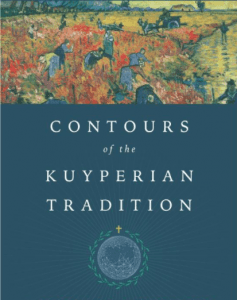Can the Kuyperian tradition produce a Mother Teresa? (You might want to read the whole post before you answer that question.)
The Neo-Calvinists are a version of modern Kuyperians, and the issue for our post today is how they see the Christian relating to politics. We are looking at Craig Bartholomew’s comprehensive sketch of the Kuyperian tradition, and in this chp we are treated to a special clarification. (See Contours of the Kuyperian Tradition. )
)
His opening claim:
It is one thing to conceive of the church as our mother in the faith. It is a lot harder to think of government in maternal terms. One reason for this is that in the Protestant tradition government is generally thought of as a postfall institution, part of God’s common grace for restraining evil and ensuring a measure of societal justice.” Personally, partly on the basis of passages like Isaiah 60,1 am more persuaded by the Thomist view that government is given, potentially, with creation, so that even after the fall it has a far more positive role.
Kuyper was clearly committed to Christian political engagement, and one of his most important clarifications is his theory of “direct” and “indirect” engagement. Of course, for Kuyper God is sovereign, Scripture is revelation, and it is the Christian’s duty to engage the world soaked in Scripture and submissive to God’s sovereignty.
It is also important to see that Kuyper engaged politics in a world of pluralism while assuming and committing himself to pluralism. He did not want a Christian nation; he was a realist who knew there would be other options. He wanted those other options protected and promised.
Not unlike William Jennings Bryan and not unlike the evangelical political engagement in the Reagan years, Kuyper formed his theory of engagement over against the encroachment of liberalism (which is not the same as progressive; it appears to me Bartholomew and others like James Bratt would see Kuyper more along progressive lines in some ways). Kuyper formed a political party, the Anti-Revolutionary Party. It appealed to little people, and thus could touch a bit on populism (this needs attention by an expert, not me).
Yes, the Kuyperian tradition can produce a Mother Teresa.
Again, sphere sovereignty is crucial to all of Kuyperianism. Laws are shaped by Scripture, creation, history, and reason.
1. All law that is to pass for just law on earth must pass the test of justice. God alone determines what is just, in accordance with his nature. 3. Insofar as human life is concerned, pure knowledge and the firmness of these divine ordinances were lost as a result of sin. 4. Natural theology and natural morality, however much to be appreciated, are therefore insufficient for getting to know the eternal principles. 5. The special, supernatural revelation of Gods Word has spread important light on those principles, including principles relevant to civil life; and it is therefore our calling to confess, also in the political domain, the eternal principles revealed in that Word.
I don’t think Kuyper diminished the church by making it one sphere among others so much as graphically misportrayed it. Rather, Kuyper himself wanted the church both protected but also to become a penetrating reality. His public theology, however, prevented him from seeing the political power of a the church in a pluralist world.
In this context Bartholomew raises the direct vs. indirect influence, and this too reframes his sphere sovereignty somewhat (so it seems to me).
The direct influence is through members of government meditating on Scripture and carrying this into their vocations. Indirectly, influence is felt through the life of God’s people in the country. He argues that the church should devote special care to its members who are in government, nurture theological studies to help the politician, and resist any view that sees civil society as of no concern for the Christian.
On the social dimension, which means justice for the poor, Kuyper can at times sound like a liberation theologian or a progressive or a social democrat because his vision is shaped by the teachings of Jesus.
Kuyper is a realist and knows that inequality will always be with us this side of the new heavens and the new earth. What we should pursue is a certain equality in which the basic needs of all are met, such as shelter, clothing, and food. Kuyper invokes in this respect the language of the rights of the poor: “This is the right that the poor have, for Christ’s sake, with respect to those possessing more. Those who possess more but fall short in this matter are not only unmerciful but commit an injustice, and for that injustice they will suffer the punishment of eternal judgment in eternal pain.” Kuyper refuses to dis entangle Jesus’ social concern from the gospel of the kingdom.
Kuyperianism has not stayed put and toward the end of the chp Bartholomew presses Jose Casanova into service and deals with his theory of secularization, which has three kinds:
1. secularization as differentiation of the secular spheres from religious institutions and norms; 2. secularization as decline of religious beliefs and practices; and 3. secularization as marginalization of religion to a privatized sphere.
If #1 is our reality then Christians need to create a more robust but engaged stance. Differentiation is not going to slow down. Secularization theory has been disproven; instead, religions today are challenging the secular realm.












